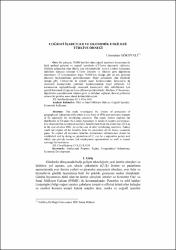Coğrafi İşaretler ve ekonomik Etkileri: Türkiye Örneği
Abstract
Bu çalışma, FSMH’dan biri olan coğrafi işaretlerin korunması ile ilgili tarihsel gelişimi ve coğrafi işaretlerin (Cİ’lerin) ekonomik etkilerini, özellikle gelişmekte olan ülkeler için irdelemektedir. Ayrıca, Lizbon Anlaşması dahilinde dünyada korunan Cİ’lerin ürünlere ve ülkelere göre dağılımına bakılmıştır. Cİ korumasından diğer FSMH’nda olduğu gibi en çok gelişmiş ülkelerin faydalandıkları gözlemlenmiştir. Diğer gelişmekte olan ülkelerde olduğu gibi, Türkiye’nin de coğrafi işaret korumasından, dolayısıyla da ekonomik kazançlardan yeterince faydalanamadığı tespit edilmiştir. Cİ korumasının sağlayabileceği ekonomik kazançların elde edilebilmesi için gerekli kurumsal altyapının tesis edilmesi gerekmektedir. Böylece, Cİ koruması, diğerlerinin yanında kırsal alanlara gelir ve istihdam sağlayan, ihracat gelirlerini arttıran bir politika aracı olarak kullanılabilecektir. This study investigates the history of protection of geographical indications (GI) which is one form of IPRs and economic impacts of GI especially for developing countries. The paper, further explores the distribution of CI under the Lisbon Agreement in terms of country and product. It is observed that developed countries benefit most from the protection of CI as in the case of other IPRs. As in the case of other developing countries, Turkey could not exploit all the benefits from the protection of GI, hence economic gains. To exploit all economic benefits, institutional infrastructure should be established and by doing so, protection of CI can be a supportive policy tool which can provide income and employment opportunities as well as export earnings for rural areas.


















